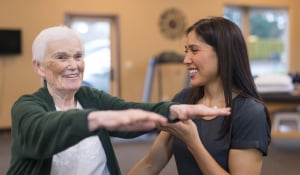The Importance of Exercise to Improve Brain Health

Starting off on the right (sneaker wearing) foot
One of our greatest assets in the fight against Alzheimer’s is learning how to slow down the progression, one way to accomplish this is brain health. There are a variety of ways to keep your brain healthy and active from brain games and word puzzles to eating the right foods. In this article, we are focusing on the importance of exercise.
Alzheimer’s disease effects the brain and as the disease progresses, effects the body. This happens when the brain cannot accurately communicate with the rest of the body and as a result fine motor skills are effected. These fine motor skills include picking up silverware, pocket change and other small objects and eventually the gross motor skills are affected including the ability to walk or go from sitting to standing.
Exercise to improve your fine and gross motor skills
- Easy exercises to include during the day with household items are: Squeezing a soft small ball, signing a name or writing, picking up toothpicks, adult coloring books, playing a board game or playing cards.
- If you are looking to combine fine motor skills with aerobic exercise look into fun group classes.
Walking is also a great form of aerobic exercise.
What should you think about before starting to exercise?
- Set realistic goals about how much exercise can be done at one time, this may include several short workouts to start.
- Be sure that anyone participating is wearing appropriate shoes and clothing.
- If you are a caregiver, walk with the person you are caring for, the exercise is good for both of you. If the person with Alzheimer’s goes for walks alone, make sure they have an id bracelet on them in case they get lost or confused while walking.
- When giving exercise instructions to someone with Alzheimer’s remember to break down the movements into simple, easy to follow steps so they do not become overwhelmed.
- Be sure to stay hydrated and remember if you are feeling thirsty, you are already dehydrated. Also remember that the brain of someone with Alzheimer’s may have trouble communicating to the body that they are feeling thirsty or dehydrated so make sure drinking water is a part of each workout.
Why is exercise so important?
Not only is exercise beneficial for working on fine motor skills but exercise may:
- Improve your mood, strengthen muscles, encourage friendships, improve self-image and is great for brain health. Exercise also releases an endorphin in the brain that builds brain cells and increases connections between one side of the brain to the other.
Find exercises that work for you or the person you are caring for and make them part of a daily routine.
This article was written in collaboration with Alison Stockman, Avita Program Director at Laurelwood at The Pinehills.
Want to learn more about brain health? Check out our article about the benefit of eating blueberries- 3 Facts About Blueberries and Brain Health
Discover life at a Northbridge community
If you’re considering senior living for yourself or a family member, we hope you’ll visit one of our communities. You’ll find a maintenance-free, activity-filled and engaging lifestyle to help support your wellness goals.
You’ll also discover many benefits in a Northbridge Senior Living community, including our Signature Program S.T.A.R. Club (Sharp Thinking, Active Residents) – which offers our residents several activities to participate in with others, including:
- Daily exercise group
- Walking club
- Tai Chi & Yoga
- Nutritional classes
- Library and book club
- Museum outings
- Artists in residence program
- Multi-generational music
- Genealogy Generations
We’re here to answer any of your questions and invite you to download our complimentary guide Just the Facts: Your Guide to Memory Care. Please contact us if we can provide further information or if you would like to schedule a personalized tour. 